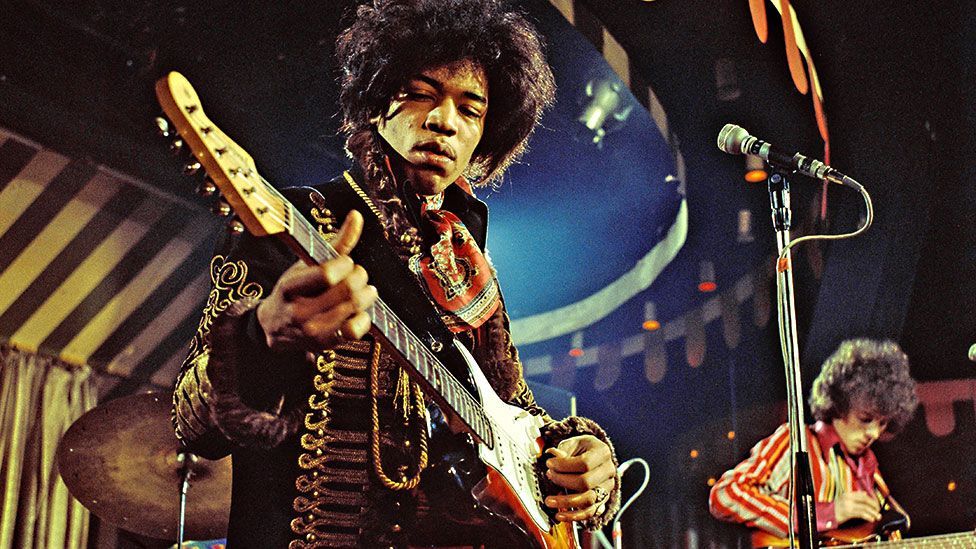Jimi Hendrix, the legendary guitarist who passed away prematurely at the age of 27 in 1970, continues to wield a profound influence on musicians worldwide.
In a 1967 interview with Steve Barker, Hendrix illuminated his key sources of inspiration, highlighting three guitarists whose impact resonated deeply with his musical journey.
During this insightful conversation, originating from his hometown of Seattle, Hendrix confessed his admiration for luminaries like Elmore James and the early works of Muddy Waters.
He accorded reverence to the likes of Robert Johnson and other venerable figures from the annals of music history.
However, when questioned about his kinship with the blues maestros of yesteryears, Jimi Hendrix remained steadfast, asserting that his vocal talents did not align with that tradition.
He rooted his initial foray into guitar playing in the vibrant musical scene of Seattle, nestled in the Northwestern expanse of the United States.
While recognizing the scarcity of authentic blues vocalists in his surroundings, Hendrix underscored the transformative period when he honed his craft in the southern locales of the nation.
A brief sojourn in military service temporarily suspended his musical pursuits, but Jimi Hendrix ingeniously extricated himself from those obligations.
Resuming his artistic pursuits, he ventured into the southern territories, where he found himself deeply captivated by the resounding echoes of the blues.
This juncture marked a watershed moment, solidifying his connection with the genre and propelling him toward a new artistic trajectory.
In a subsequent interview with Rolling Stone magazine in 1968, Hendrix lavished praise upon Muddy Waters, pinpointing him as the inaugural guitarist who caught his attention.
Recalling his formative years, Hendrix recounted his encounter with an old Muddy Waters record, an experience that both bewildered and electrified him.
The array of sounds emanating from the record provoked a profound curiosity, fanning the flames of his musical exploration. This pivotal moment ignited his creative journey, spurring him onward in the pursuit of musical innovation.
As a testament to his appreciation for Muddy Waters’ legacy, Hendrix, alongside bassist Billy Cox and drummer Buddy Miles—eventually christened as the Band of Gypsys—reinvented “Mannish Boy” through their collaborative rendition in 1969.
Muddy Waters, a luminary known for iconic tracks like “Mannish Boy,” “I’m Your Hoochie Coochie Man,” “Rollin’ Stone,” and “Got My Mojo Working,” received posthumous recognition as he was inducted into the Rock and Roll Hall of Fame in 1987, an honor bestowed by Paul Butterfield.
Equally influential, Robert Johnson, a pivotal figure in the history of blues music, etched his mark through a limited yet impactful studio presence.
Johnson’s recorded legacy, comprising 29 distinct songs from two recording sessions in 1936 and 1937, dramatically altered the trajectory of the blues genre.
His untimely demise at the age of 27 in 1938, shrouded in mystery and speculation, added layers to the enigma surrounding his life and music.
Despite the ambiguity surrounding his passing, his unparalleled contributions continue to reverberate through time.
Recognizable tracks such as “Cross Road Blues,” “Me and the Devil Blues,” “Sweet Home Chicago,” and “Hellhound On My Trail” embody Johnson’s enduring influence.
His lasting impact was acknowledged through his induction into the Rock and Roll Hall of Fame in 1986, a distinction bestowed by Robert Palmer.
Elmore James, born in 1918 in Richland, Holmes County, Mississippi, earned his epithet as the “King of the Slide Guitar.”
Acknowledged for his adept use of amplified sound and evocative vocals, James left an indelible imprint on the blues landscape.
His memorable works, including songs like “The Sky Is Crying,” “Dust My Broom,” and “Shake Your Money Maker,” solidify his status as a blues luminary.
In 1992, he was posthumously inducted into the Rock and Roll Hall of Fame, an honor presented by Robbie Robertson of The Band.
Jimi Hendrix’s tribute to these three foundational guitarists, alongside his groundbreaking innovations, cements his legacy as a pivotal force in the evolution of music.
His resonance continues to inspire and guide musicians across the globe, underscoring his enduring impact on the world of artistry.

